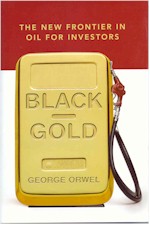 |
|
|
| ||||||
|
|
This page is the original source of this review, though you may also find it on Amazon or other sites. | ||
| Book Reviews Home | Free Audio Books | |
 |
Book Review of: Black GoldWe recommend Black Gold.
Price: $17.61 |
| Review
of Black Gold, by George Orwel Reviewer: Mark Lamendola The subtitle of this book, "The New Frontier in Oil for Investors," would indicate this book is a guide to investing in oil. It is not. If you're looking for a manual that will tell you how to make gazillions of dollars from investments in the oil marketplace, keep looking. Black Gold does provide some good tips for investors, but few of those would be new to seasoned investors. The real value of this book lies elsewhere: understanding the energy issues facing industrialized nations. This particular topic is one where the "ignorati" weigh in with various unfounded opinions and absurd suggestions--everything from suggesting Americans should boycott certain gas stations to assuming technology will provide new energy sources that make oil obsolete. Orwel, unlike the "analytically-challenged" talking heads, very clearly presents the picture on the looming energy crisis. Is there really an energy crisis? Many "experts" assure us there is not. They point to alternative energy sources and say we have nothing to worry about because these sources are here now. All we have to do is switch over--no problem. Orwel dispels these notions by examining a few of these. For example, he points out that "We could line the Atlantic coast with windmills and still not make much of a dent in electricity demand." Many experts who agree there is an energy crisis also say the easy solution is to simply extract more oil. They recommend such thing as drilling in ANWAR or expanding production in existing fields. The first recommendation ignores the realities of enormous lead times. The second one violates the principle of getting blood from a turnip. Even if we could do these things right now, they wouldn't fill the gap produced by projected demand in the near term.
Other experts say we need to conserve. They are correct, but we can't conserve enough to prevent ourselves from running out of oil in the relatively near future. Orwel discusses how much oil we actually have, the problems in tapping into proven reserves, refining issues, and public policy problems that hamper any efforts to increase the oil supply. He also provides a detailed explanation regarding how most of the available oil is in politically unstable countries. A supply disruption is more likely than not, in the near future. What about demand? Where has it all come from? Orwel tells us that, as well. But he is careful not to simply discuss the present drivers of supply and project a linear curve from there. He looks deeper, drawing on both historical data and emerging trends. By the time you get 50 pages into the book, it is fairly obvious that you don't need to read his biography to know he's an analyst, and a good one at that. To me, this book is "required reading" for all people who have been surprised over the rise in gas pump prices in the last couple of years. For the rest of us, it helps us understand what's coming and how to prepare for it. From the book's subtitle we know the book will reveal some things about investment opportunities. But, it reveals so much more. | |
>
About these reviewsYou may be wondering why the reviews here are any different from the hundreds of "reviews" posted online. Notice the quotation marks? I've been reviewing books for sites like Amazon for many years now, and it dismays me that Amazon found it necessary to post a minimum word count for reviews. It further dismays me that it's only 20 words. If that's all you have to say about a book, why bother? And why waste everyone else's time with such drivel? As a reader of such reviews, I feel like I am being told that I do not matter. The flippancy of people who write these terse "reviews" is insulting to the authors also, I would suspect. This sound bite blathering taking the place of any actual communication is increasingly a problem in our mindless, blog-posting Webosphere. Sadly, Google rewards such pointlessness as "content" so we just get more if this inanity. My reviews, contrary to current (non) standards, actually tell you about the book. I always got an "A" on a book review I did as a kid (that's how I remember it anyhow, and it's my story so I'm sticking to it). A book review contains certain elements and has a logical structure. It informs the reader about the book. A book review may also tell the reader whether the reviewer liked it, but revealing a reviewer's personal taste is not necessary for an informative book review. About your reviewer
About reading styleNo, I do not "speed read" through these. That said, I do read at a fast rate. But, in contrast to speed reading, I read everything when I read a book for review. Speed reading is a specialized type of reading that requires skipping text as you go. Using this technique, I've been able to consistently "max out" a speed reading machine at 2080 words per minute with 80% comprehension. This method is great if you are out to show how fast you can read. But I didn't use it in graduate school and I don't use it now. I think it takes the joy out of reading, and that pleasure is a big part of why I read. |
| |||||